Related Research Articles

George Victor Voinovich was an American politician who served as a United States senator from Ohio from 1999 to 2011. He previously served as the 65th governor of Ohio from 1991 to 1998 and as the 54th mayor of Cleveland from 1980 to 1989, the last Republican to serve in that office.
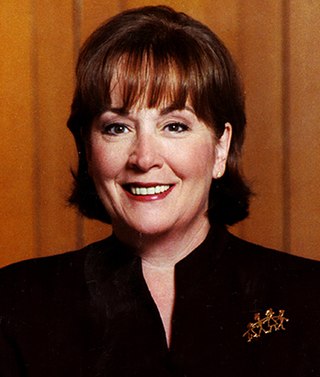
Nancy Elizabeth Hollister is an American politician from the U.S. state of Ohio. Hollister was the first and, to date, only female governor of Ohio, serving briefly from December 1998 to January 1999.

Anthony Joseph "Tony" Celebrezze Jr. was an American politician of the Democratic party, who served as Ohio Attorney General, Ohio Secretary of State and an Ohio State Senator. He was the son of Anthony J. Celebrezze, and part of the Celebrezze political dynasty, which was prominent in Cleveland in particular and statewide in Ohio throughout the second half of the 20th century and early 2000s.

Anthony Joseph Celebrezze Sr. was an American politician of the Democratic Party, who served as the 49th mayor of Cleveland, Ohio, as a cabinet member in the Kennedy and Johnson administrations, and as a United States circuit judge of the United States Court of Appeals for the Sixth Circuit.

Frank D. Celebrezze Jr. was an American politician and jurist. A member of the Democratic Party, he served as Chief Justice of the Ohio Supreme Court from 1978 to 1986.

James Patrick Celebrezze was an American politician and jurist of the Ohio Democratic party, who served as a judge of the Cuyahoga County, Ohio, common pleas court. His daughter, Leslie Celebrezze, was elected to fill his seat after his retirement.
Frank D. Celebrezze I was an Italian-American politician, judge and former public safety director in Cleveland, Ohio.
Roxanne Qualls is an American politician who served as the 66th mayor of Cincinnati, Ohio. She also served a two-year term on the Cincinnati City Council prior to her service as mayor, having been elected in 1993. On August 8, 2007, the Charter Committee announced her appointment to fill the unexpired term of council member Jim Tarbell. Qualls was elected to a two-year term on Cincinnati City Council in November 2007, and again in 2009 and 2011. She served as Vice Mayor, the chair of the Budget and Finance Committee, chair of the Livable Communities Committee and chair of the Subcommittee on Major Transportation and Infrastructure Projects.
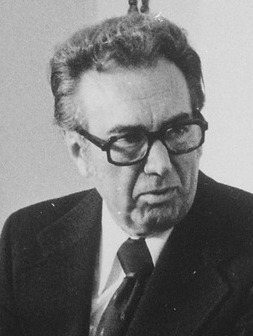
Ralph Joseph Perk was an American politician who served as the 52nd mayor of Cleveland, Ohio from 1971 to 1977.

Sue Ellen Myrick is an American businesswoman and the former U.S. Representative for North Carolina's 9th congressional district, serving from 1995 to 2013. She is a member of the Republican Party. She was the first Republican woman to represent North Carolina in Congress. On February 7, 2012, she announced that she was retiring. She left Congress in January 2013 and was succeeded by Robert Pittenger.
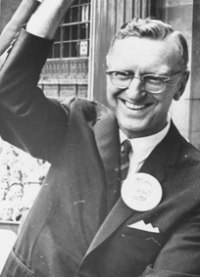
Ralph Sidney Locher was a Romanian-born American politician of the Democratic Party who served as the 50th mayor of Cleveland, Ohio.

Mary Rose Oakar is an American Democratic politician and former member of the United States House of Representatives from Ohio, serving from 1977 to 1993. Oakar was the first Arab American woman, first Syrian American, and first Lebanese American woman to serve in Congress. She was also the first Democratic woman elected to the United States Congress from that state. Oakar later served as a member of the Ohio State Board of Education.

Marcia Louise Fudge is an American attorney and retired politician who served as the 18th United States Secretary of Housing and Urban Development from 2021 to 2024. A member of the Democratic Party, she served as the U.S. representative for Ohio's 11th congressional district from 2008 to 2021. The district included most of the black-majority precincts between Cleveland and Akron.

Nina Hudson Turner is an American politician, and television personality. A member of the Democratic Party, she was a Cleveland City Council member from 2006 to 2008 and a member of the Ohio Senate from 2008 until 2014. Turner was the Democratic nominee for Ohio Secretary of State in 2014, but lost in the general election against incumbent Jon Husted, receiving 35.5 percent of the vote. A self-described democratic socialist, her politics have been variously described as progressive, left-wing, or far-left.
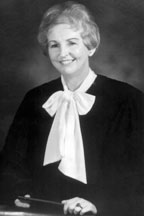
Blanche Ethel Krupansky was a Cleveland, Ohio, United States judge who became the second woman to sit on the Ohio Supreme Court when she was appointed in 1981.
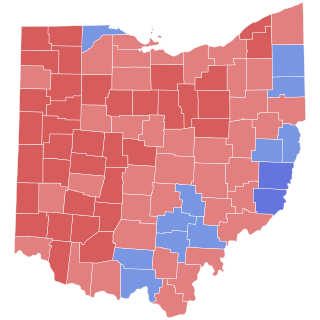
The 1990 Ohio gubernatorial election was held on November 6, 1990. Incumbent Democratic governor Dick Celeste was unable to run for a third consecutive term due to term limits. Former mayor of Cleveland George Voinovich, who also ran for the United States Senate in 1988, was uncontested for the Republican nomination, while Ohio Attorney General Anthony J. Celebrezze Jr. emerged from the Democratic primary. In the end, Voinovich was able to defeat Celebrezze by a fairly wide margin, winning his first term in office.
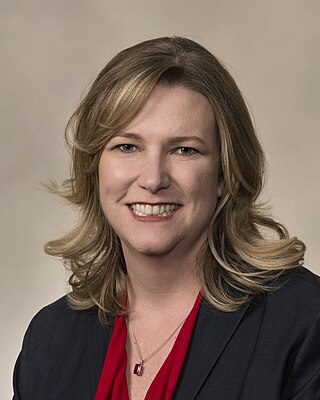
Nannette L. Whaley is an American politician who served as the 56th mayor of Dayton, Ohio, from 2014 to 2022. A member of the Democratic Party, she was first elected to the mayorship in November 2013, after serving on the city commission for two terms. Whaley presided over the United States Conference of Mayors from 2021 to 2022. She was the Democratic nominee in the 2022 Ohio gubernatorial election, losing to incumbent Mike DeWine.
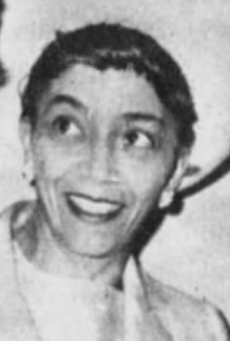
Eugenia "Jean" Marie Murrell Strode Capers was an American judge, educator, and politician.

The 1979 Cleveland mayoral election took place on November 6, 1979, to elect the Mayor of Cleveland, Ohio. George Voinovich defeated incumbent mayor Dennis Kucinich. The election was officially nonpartisan, with the top two candidates from the October 2 primary advancing to the general election.
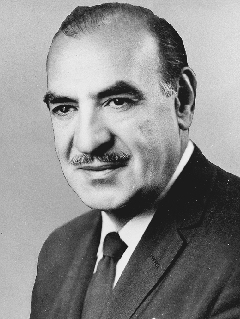
The Cleveland mayoral election of 1961 saw the fourth re-election of incumbent mayor Anthony J. Celebrezze. His Republican opponent was Albina Cermak, the first woman to run for mayor of Cleveland.
References
- ↑ Mary Kilpatrick, cleveland com (2018-08-17). "33 (more) women who made Cleveland history". cleveland. Retrieved 2024-03-12.
- 1 2 "CERMAK, ALBINA | Encyclopedia of Cleveland History | Case Western Reserve University". case.edu. 2019-10-02. Retrieved 2024-03-17.
- 1 2 Deinhart, Mari (2023-09-29). "Albina R. Cermak - She Brought Her Hat to the 1961 Mayoral Bid". Cleveland Historical.
- ↑ Congress, United States (1957). Congressional Record: Proceedings and Debates of the ... Congress. U.S. Government Printing Office.
- ↑ Becker, Thea Gallo (2012). "Legendary Locals of Cleveland". Arcadia Publishing.